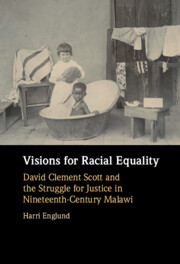 Visions for Racial Equality
Visions for Racial Equality Book contents
- Visions for Racial Equality
- Visions for Racial Equality
- Copyright page
- Contents
- Figures
- Maps
- Preface and Acknowledgements
- Maps
- 1 Introduction
- 2 Among the Wild Scotsmen
- 3 Champagne and Slaves
- 4 The Universal Vernacular
- 5 Frightful Libel upon Humanity
- 6 Rhodes Must Not Rise
- 7 A Future Foreclosed
- 8 Grief Never Wears Out
- 9 Liberal Translations
- 10 The Rest Is History
- Bibliography
- Index
1 - Introduction
Published online by Cambridge University Press: 10 February 2022
- Visions for Racial Equality
- Visions for Racial Equality
- Copyright page
- Contents
- Figures
- Maps
- Preface and Acknowledgements
- Maps
- 1 Introduction
- 2 Among the Wild Scotsmen
- 3 Champagne and Slaves
- 4 The Universal Vernacular
- 5 Frightful Libel upon Humanity
- 6 Rhodes Must Not Rise
- 7 A Future Foreclosed
- 8 Grief Never Wears Out
- 9 Liberal Translations
- 10 The Rest Is History
- Bibliography
- Index
Summary
Christian missionaries in nineteenth-century Africa held a variety of views on race relations. Anthropologists have belatedly included White missionaries in their studies, but the caricature of the missionary as imperialist has marred some of them. The Church of Scotland missionary David Clement Scott pursued a vision for racial equality in Malawi, where the African Church would foster interracial worship and would involve Africans in positions of responsibility from early on. Scott fits uneasily into the category of primitivist or Afrocentric missionaries, because his emphasis was on the co-construction of knowledge with Africans. His vision outlined a theology of reversals in which the figure of the risen Christ inspired a consideration of the prejudices that many Europeans held against Africans. His struggle for justice became epistemic as well as practical with his insistence on Africans as knowledgeable fellow human beings. Current calls for epistemic freedom by some decolonial intellectuals may assert a divide between European and African knowledge in a way that precludes the search for epistemic justice based on common humanity. Those calls may also repeat some of the primordialism in earlier attempts by missionaries and African intellectuals to define African culture and African religion.
- Type
- Chapter
- Information
- Visions for Racial EqualityDavid Clement Scott and the Struggle for Justice in Nineteenth-Century Malawi, pp. 1 - 32Publisher: Cambridge University PressPrint publication year: 2022


